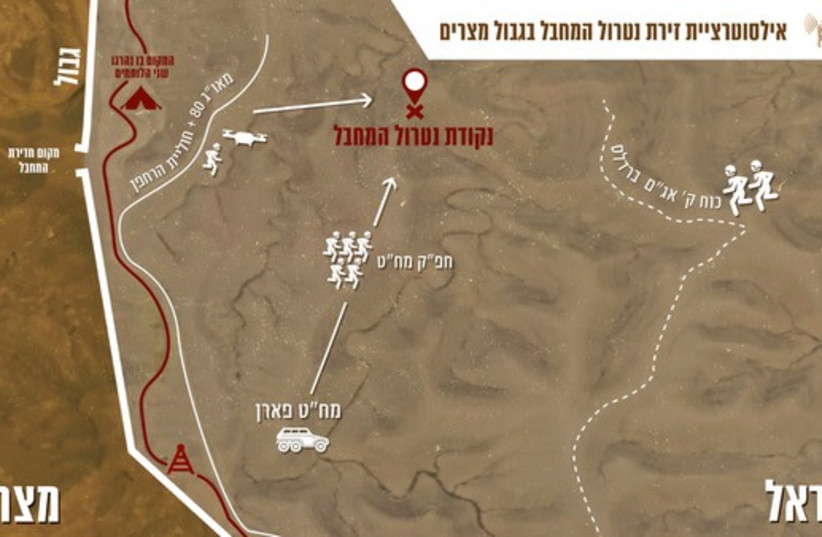The IDF on Tuesday presented the results of its probe into the June 3 terror attack in which three IDF soldiers who were guarding the border were killed by a rogue Egyptian policeman.
According to the probe, the IDF units and commanders involved are still viewed generally as having strong and successful records guarding the border.
The two central failures which led to the deaths of the IDF soldiers, according to the probe, were a gap in the security fence between Israel and Egypt and an imbalance in preparing the relevant IDF units for terror situations versus the more common criminal smuggling situations.
Three senior commanders received a mix of reprimands and command transfers, but some in the media were critical that the punishments for the IDF commanders involved were not more substantial.
Regarding the gap in the fence, the IDF noted that the very small gap of half a meter by half a meter which was somewhat covered up and was partially but only lightly sealed was nominally hidden from the naked eye.
As such, the IDF had believed that the gap was safe.
The reason for the gap was to allow adjustments to the fence and for various special security situations which remain classified.
However, IDF Southern Commander Maj. Gen. Eliezer Toledano admitted that this gap, and keeping it secret even from almost all lower levels of IDF border guards, was a significant conceptual failure.
According to Toledano, only higher echelons and select others knew of the gap in the IDF said, which left Sgt. Lia Ben Nun and St.-Sgt. Uri Itzhak Ilouz open to being surprised by the Egyptian police officer, turned terrorist.
Estimates are that the Egyptian border policeman had figured out that there was a gap during the course of his patrols even though nominally the Egyptian border police in general are not supposed to have known about the partially disguised gap.
The gap has been sealed so that the same method of attack cannot be reused.
The IDF would not clarify how it would manage the border fence repairs or special situations now that it could no longer use the gap in the fence.
Preparedness for terror attacks found to be lacking
Regarding the balance of preparedness for terror attacks versus smuggling situations, Toledano said that it was partially understandable that the focus was on preventing smuggling because the vast majority of incidents fell into that category.
At the same time, the IDF said that the 12-hour shifts that the border guards were performing over multiple months were too long and could harm their readiness.
Further, the IDF has committed that going forward, there will be four soldiers per guard post such that each post will have 360-degree coverage, making it harder for a terrorist to sneak up on the post from behind.
This is despite the fact that the IDF said that spreading its forces into relatively small units along the border is generally the right strategy to cover the vast area which runs for several dozen kilometers in each of three different Egyptian border areas delineated by the IDF.
The IDF strongly rejected various rumors about improper conduct by the two soldiers, saying that when they were found dead, they were fully armed and properly attired and appeared to have performed their duties properly.
St.-Sgt. Ohad Dahan was killed hours later during a firefight with the Egyptian terrorist, in which another soldier was also injured.

Despite the IDF considering the above two issues as the main problems, when Dahan was killed with a bullet to the head, he did not have a helmet on.
Some others who approached the terrorist also did not have helmets on.
In addition, there were multiple instances in which IDF soldiers heard gunfire or had suspicions of something being out of place, but where they did not properly report their suspicions.
Further, at least one IDF commander who ordered an initial approach to take down the terrorist, which did not succeed, was viewed as not having properly constructed the operation to approach the terrorist.
When the terrorist was killed later, it was through a multifront attack in which all escape points were cut off before the terrorist was approached.
Egypt 'very embarrassed' by terrorist attack
Although Egypt initially said that the border policeman was pursuing drug smugglers, Toledano said that confronted with the full IDF findings, the Egyptians “were very embarrassed.”
At the same time, Toledano said, “the relationship with Egypt is strategic,” and that Israel appreciated its regular cooperation.
He suggested that he expected answers from Cairo about what went wrong with the Egyptian border policeman and how it would prevent future similar rogue incidents.
Additional information from Egypt could be received as early as this coming Thursday.
IDF commanders censured after attack
IDF Brig. Gen. Itzik Cohen, the commander of the Adom forces in the South, was censured for his general responsibility for the incident, especially regarding establishing correct protocols.
IDF Col. Ido Tzaad, commander of the Paran Brigade, has been removed from his command and will be transferred to another role within the IDF, based on errors in his handling of related protocols. At the same time, he was praised for his role in isolating and killing the terrorist.
IDF Bardalas battalion commander Lt. Col. Ivan Kon was reprimanded for both his conceptual and tactical role in the incident and his promotion will be delayed or frozen for five years.
